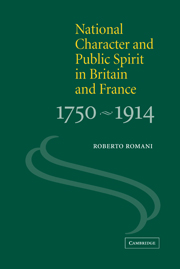Summary
The ambiguities of national character
This book deals with the history of national character in European political and economic thought, c.1750–c.1914. It considers British, French, and, to a lesser extent, Italian authors – the latter being included to provide a comparison with a viewpoint originating from circumstances very different from those of Britain and France, where national unification and consolidation were achieved much earlier. The names of Montesquieu, Hume, Staël, Tocqueville, Carlyle, Mill, Taine, Durkheim, or Marshall suffice to demonstrate that national character was a cornerstone of social thought in the period in question. Attention has often been paid to the relevance of the theme in single authors, but national character has not become a standard point of reference to assess their contributions, and an overarching treatment, which narrated the vicissitudes of the idea rather than those of its exponents, has so far been lacking.
Regarding an initial definition of national character, the one offered by Ernest Barker is only apparently banal: ‘a mental organization connecting the minds of all the members of a national community by ties and connections as fine as silk and as firm as steel’. Barker suggests the strength of national character, seemingly paradoxical in view of its non-materiality. I would go further by arguing that it benefits from a radical abstractness, which derives from the impossibility of assessing with any precision either its attributes or the range and efficacy of its effects.
- Type
- Chapter
- Information
- Publisher: Cambridge University PressPrint publication year: 2001



